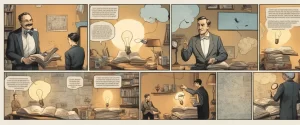——Staring at the Sun by Irvin D. Yalom & Man’s Search For Meaning by Viktor E. Frankl

In the realm of existential literature, where humanity grapples with the profound questions of existence and the search for meaning, two seminal works emerge as poignant explorations of the human condition: “Staring at the Sun,” written by renowned psychotherapist Irvin D. Yalom, and “Man’s Search for Meaning,” penned by psychiatrist and Holocaust survivor Viktor E. Frankl. While these two remarkable books are separated by time and context, they converge in their profound examination of the human experience and the quest for purpose. Through distinct yet complementary perspectives, Yalom and Frankl paint a vivid picture of human resilience, navigating the complexities of life, mortality, and the universal yearning for a meaningful existence.
In “Staring at the Sun,” Yalom delves into the universal human fear of death and how it shapes our lives. Drawing on his extensive clinical experience and his own encounters with mortality, he offers a compassionate exploration of death anxiety, illuminating the ways in which individuals grapple with the inevitability of their own mortality. Through intimate and poignant case studies, Yalom invites us to confront the existential predicament, urging us to embrace life fully as we recognize the finite nature of our existence.
On the other hand, “Man’s Search for Meaning” takes us on a remarkable journey through Viktor E. Frankl’s personal experiences during his time in Nazi concentration camps. Through his harrowing tale of survival, Frankl elucidates the philosophy of logotherapy, which centers on the belief that finding meaning in life is the driving force behind human existence. Frankl’s poignant reflections on suffering, adversity, and the triumph of the human spirit provide a profound testament to the power of meaning and purpose in the face of unimaginable adversity.
While Yalom’s work delves into the universal fear of death and Frankl’s memoir explores the depths of suffering, these two books converge in their profound exploration of human existence and the search for meaning. Both Yalom and Frankl approach their subjects from different angles – one from the perspective of a psychotherapist, the other a Holocaust survivor – yet both emphasize the essential role of meaning in our lives. These works compel us to reflect on the human condition, inviting us to question our own quest for purpose and significance.
In this comparative study, we will delve into the nuanced similarities and disparities between Yalom’s “Staring at the Sun” and Frankl’s “Man’s Search for Meaning.” By examining the authors’ distinct lenses and unique contexts, we will uncover the threads that unite these two extraordinary works, offering a comprehensive understanding of the human search for meaning in the face of mortality and suffering. Together, we will embark on a transformative journey, exploring the depths of the human psyche and contemplating the timeless question that lies at the core of human existence: What makes life worth living?
Brief Summary of Two Books
Staring at the Sun by Irvin D. Yalom
“Staring at the Sun” by Irvin D. Yalom is a non-fiction book that explores the fear of death and the art of living a fulfilling life. Yalom, a psychotherapist and renowned author, delves into the existence of death anxiety that lies deep within everyone and how it influences various aspects of life.
The book is divided into three parts. In the first part, Yalom reveals the psychological concept of death anxiety and its impact on our behaviors, decisions, and relationships. Through his therapeutic experiences, he narrates the stories of different individuals who are facing their mortality and the unique ways they cope with this fear.
The second part of the book delves into the aspects of life that can help overcome death anxiety and embrace life in a more meaningful way. Yalom explores themes such as confronting death early on, reflecting on one’s life and values, seeking relationships and intimacy, and finding purpose and meaning. He offers insights and practical exercises to help readers explore their own mortality and make the most of their time on earth.
The final part of the book deals with the transcendence of death anxiety and explores the concept of existential therapy. Yalom delves into the works of philosophers, writers, and other therapists who have contributed their perspectives on the human condition and overcoming the fear of death. Through a combination of psychotherapy techniques and existential philosophies, he provides strategies for achieving a sense of freedom and fulfillment even in the face of mortality.
Overall, “Staring at the Sun” is a thought-provoking and introspective book that aims to help readers confront and overcome their fear of death. Yalom’s expertise as a psychotherapist shines through as he combines personal stories, therapeutic techniques, and philosophical musings to provide guidance on living fully in the face of our inevitable mortality.
Man’s Search For Meaning by Viktor E. Frankl
“Man’s Search for Meaning” by Viktor E. Frankl is a powerful memoir and psychological exploration based on the author’s experiences as a prisoner in Nazi concentration camps during World War II. In the book, Frankl reflects on his time in the camps and shares his survival story, while also delving into his theory of logotherapy, a form of psychotherapy that emphasizes the search for meaning in life as the primary driving force for human beings.
The first part of the book details Frankl’s personal experiences in the camps, presenting a harrowing account of the dehumanization, suffering, and loss he witnessed and endured. Despite the extreme conditions, Frankl discovers that those who found meaning or a sense of purpose in their lives were more likely to survive and persevere through the hardships.
Frankl’s theory of logotherapy is introduced in the second part of the book. He argues that the search for meaning is a fundamental human need and that it can be found through three avenues: creating a work or doing a deed, experiencing love and connection with others, and finding meaning in suffering. He emphasizes that even in the most difficult circumstances, humans have the freedom to choose their attitudes and find meaning in their lives.
Throughout the book, Frankl stresses the notion that suffering is not inherently meaningless, but rather an opportunity for personal growth and the discovery of one’s purpose. He presents his experiences and theories as a call to individuals to take responsibility for their lives, find meaning, and live purposefully.
“Man’s Search for Meaning” remains a profound and influential work that provides insight into the human capacity for resilience, finding purpose, and the importance of seeking meaning in life, even amidst immense suffering and adversity.
Comparison between Two Books

Similarities in Psychological Healing
Both “Staring at the Sun” by Irvin D. Yalom and “Man’s Search For Meaning” by Viktor E. Frankl delve into the realm of psychological healing, although the approaches and contexts differ. In these books, several similarities can be identified regarding the process of psychological healing.
1. Facing mortality: Both Yalom and Frankl discuss the premise of facing one’s mortality as an essential step towards psychological healing. Yalom emphasizes the fear of death as a fundamental existential concern, and Frankl illustrates how confronting the inevitability of death can amplify meaning and purpose in life.
2. Searching for meaning: Both authors stress the significance of searching for meaning, particularly in the face of adversity. Yalom explores the notion of creating meaning and purpose in life through connecting with others and engaging in life-affirming experiences. Similarly, Frankl argues that finding meaning can help individuals endure even the most challenging circumstances.
3. Existential concerns: Yalom and Frankl explore various existential concerns that impact psychological healing. They both investigate common human struggles such as finding a sense of purpose, facing one’s fears, and grappling with the meaning of life. By addressing these concerns, they offer readers avenues to explore their own psychological healing.
4. Connection and relationships: Both books emphasize the importance of connection and relationships in the healing process. Yalom demonstrates how interpersonal relationships and genuine connections can help individuals confront their fears and ultimately experience emotional growth. Similarly, Frankl narrates how human connection and camaraderie play a crucial role in psychological healing, as demonstrated during his time in concentration camps.
5. Self-reflection: Yalom and Frankl advocate for introspection and self-reflection as powerful tools for psychological healing. They explore the importance of understanding one’s internal landscape, values, and motivations in order to heal and find meaning in life.
In conclusion, “Staring at the Sun” by Irvin D. Yalom and “Man’s Search For Meaning” by Viktor E. Frankl share several similarities in their approaches to psychological healing. Both books highlight the significance of facing mortality, searching for meaning, addressing existential concerns, valuing connections and relationships, and embracing self-reflection as integral components of the healing process.
Divergences in Psychological Healing
Staring at the Sun by Irvin D. Yalom and Man’s Search For Meaning by Viktor E. Frankl are two profound and influential books within the field of psychology that explore and delve into the complexities of human existence, particularly in relation to psychological healing. While both books touch upon similar themes of confronting mortality and finding purpose in life, they diverge significantly in their approaches and perspectives on psychological healing.
One prominent divergence between the two books lies in their underlying philosophies. Yalom, in Staring at the Sun, focuses on the concept of death anxiety and the ways in which individuals can come to terms with their mortality. He delves into various philosophical and psychological insights, advocating for embracing the finiteness of life and creating meaning through relationships and personal accomplishments. Yalom’s therapeutic techniques often revolve around confronting and accepting one’s fears, leading to personal growth and increased psychological well-being.
On the other hand, Frankl’s Man’s Search For Meaning takes a different approach to psychological healing. Drawing from his experiences as a Holocaust survivor, Frankl argues that the search for meaning and purpose in life is the primary motivating force for human beings. He proposes his theory of logotherapy, which focuses on finding significance even in the face of suffering. Frankl asserts that individuals can discover meaning by engaging in meaningful work, through love and relationships, and by choosing a positive attitude towards unavoidable suffering. Unlike Yalom’s emphasis on accepting mortality, Frankl’s approach centers on finding purpose and meaning, even in the most challenging circumstances.
Additionally, the therapeutic techniques outlined by Yalom and Frankl also demonstrate a divergence in their approaches to psychological healing. Yalom’s techniques often involve the development of a therapeutic relationship and creating a safe space for individuals to explore their fears and anxieties about death. Utilizing existential techniques, he encourages clients to confront their deepest fears, foster personal growth, and live more authentically. In contrast, Frankl’s logotherapy places significant importance on self-transcendence and finding meaning beyond oneself. His techniques involve helping individuals discover and fulfill their unique purpose in life, thus providing a sense of meaning that can serve as a source of resilience and psychological healing.
In summary, while both Staring at the Sun and Man’s Search For Meaning touch upon universal themes of mortality and finding meaning, they diverge significantly in their perspectives on psychological healing. Yalom’s book emphasizes accepting the finiteness of life and personal growth through confronting fears, whereas Frankl’s work centers on finding purpose and meaning, especially in the face of adversity. By understanding and appreciating these divergences, readers can gain a broader understanding of the diverse approaches within the field of psychological healing.

Conclusion
Both “Staring at the Sun” by Irvin D. Yalom and “Man’s Search For Meaning” by Viktor E. Frankl are highly regarded books that offer valuable insights into the human experience. However, choosing which book is more worthy of reading ultimately depends on one’s personal interests and preferences.
“Staring at the Sun” is a book that explores the human fear of death and the potential for finding meaning in life despite this fear. Yalom, a prominent existential psychiatrist, delves into various philosophical and psychological perspectives, drawing on his experiences as a therapist, to help readers confront their mortality and live more authentically.
On the other hand, “Man’s Search for Meaning” is a compelling memoir by Viktor Frankl, a Holocaust survivor and psychiatrist. This book examines Frankl’s experiences in Nazi concentration camps and his subsequent development of logotherapy, a form of psychotherapy focused on finding meaning in life. It delves into the depths of human suffering and resilience, offering profound insights into the human spirit and the pursuit of purpose.
Both books have garnered critical acclaim and have influenced countless readers. “Staring at the Sun” may appeal to those interested in existential themes, grappling with mortality, and finding meaning in life. On the other hand, “Man’s Search for Meaning” might resonate more with readers interested in a firsthand account of human suffering, resilience, and the search for meaning in extreme circumstances.
Ultimately, the choice between the two books depends on your specific interests and which themes resonate with you the most. Both books offer valuable perspectives and can be transformative reads, so it may be worthwhile to eventually read both if possible.



